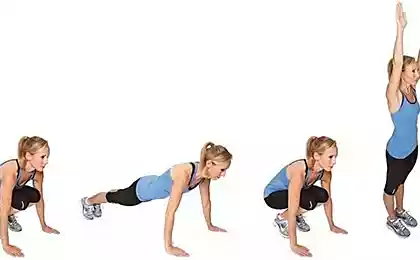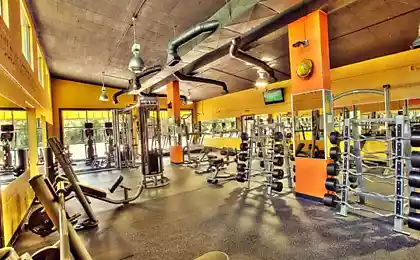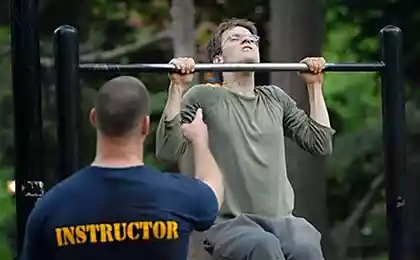375
Cardio on an empty stomach: myths and reality
Theory by bill Phillips based on the fact that prolonged lack of food leads to a decrease in circulating blood sugar, causing glycogen levels dropping. Consequently, our body as source of energy for the workouts to use muscular energy and the reserves of subcutaneous fat. And low insulin level at this point will be further to facilitate the breakdown of fats, improving the availability of fatty acids for use as energy.

Let us analyze the pros and cons of this method.
Arguments for 1. In the morning, after 8-10 hours sleep, in the body reduced amount of glycogen, so the body mobilizes the fats. The same foods causes the release of insulin, which prevents the mobilization of fat.
2. After the morning cardio on an empty stomach the rate of metabolism is still some time remains elevated, that is, the body continues to fight the fat after the workout. Scientists explain this effect of "afterburning" excess oxygen consumption after exercise.
3. You will learn it easier to Wake up at the same time each day because circadian (circadian) rhythm will help the body to adapt to morning load.
4. Morning cardio will give you cheerfulness and good mood for the whole day, thanks to the release of endorphins.
In favor of cardio on an empty stomach they say and the research conducted by a University of Kansas. Their results were published in the journal Medicine and Science in Sports and Exercise ("Medicine and science in sports and exercise").
This experiment confirmed that fat is burnt faster if you perform cardio on an empty stomach, than if the same exercise is done after eating. The researchers measured respiratory gas exchange, caloric expenditure and carbohydrate and fatty acid metabolism, and found that the amount of fat burned during aerobic exercise after 12-hour starvation, 67% of the total consumption of energy during the day. After eating, the figure was 50 percent.
Arguments against 1. As you can see, cardio on an empty stomach gives results, but it is not as huge as many expect. This is due to the fact that our body contains many fatty acids, which can't be used by working muscles. But after a workout these fatty acids run back to fat cells converted into triglycerides.
2. High intensity cardio on an empty stomach danger of losing muscles. After an overnight fast, glycogen, and insulin are low. And this is the optimal condition not only for fat burning but for burning muscle because carbohydrate food sources are small, and the level of catabolic stress hormone cortisol is quite high.

In turn, studies show that if cardio on an empty stomach to perform at 50 percent of maximum heart rate, you will not have to worry about losing muscle. However, the result in this case will not be different from cardio after eating.
We can say that cardio on an empty stomach is a double — edged sword. Therefore, before spending on an experiment, decide what goal you pursue, and consult your coach.published
P. S. And remember, only by changing their consumption — together we change the world! ©
Source: fitfixed.com

Let us analyze the pros and cons of this method.
Arguments for 1. In the morning, after 8-10 hours sleep, in the body reduced amount of glycogen, so the body mobilizes the fats. The same foods causes the release of insulin, which prevents the mobilization of fat.
2. After the morning cardio on an empty stomach the rate of metabolism is still some time remains elevated, that is, the body continues to fight the fat after the workout. Scientists explain this effect of "afterburning" excess oxygen consumption after exercise.
3. You will learn it easier to Wake up at the same time each day because circadian (circadian) rhythm will help the body to adapt to morning load.
4. Morning cardio will give you cheerfulness and good mood for the whole day, thanks to the release of endorphins.
In favor of cardio on an empty stomach they say and the research conducted by a University of Kansas. Their results were published in the journal Medicine and Science in Sports and Exercise ("Medicine and science in sports and exercise").
This experiment confirmed that fat is burnt faster if you perform cardio on an empty stomach, than if the same exercise is done after eating. The researchers measured respiratory gas exchange, caloric expenditure and carbohydrate and fatty acid metabolism, and found that the amount of fat burned during aerobic exercise after 12-hour starvation, 67% of the total consumption of energy during the day. After eating, the figure was 50 percent.
Arguments against 1. As you can see, cardio on an empty stomach gives results, but it is not as huge as many expect. This is due to the fact that our body contains many fatty acids, which can't be used by working muscles. But after a workout these fatty acids run back to fat cells converted into triglycerides.
2. High intensity cardio on an empty stomach danger of losing muscles. After an overnight fast, glycogen, and insulin are low. And this is the optimal condition not only for fat burning but for burning muscle because carbohydrate food sources are small, and the level of catabolic stress hormone cortisol is quite high.

In turn, studies show that if cardio on an empty stomach to perform at 50 percent of maximum heart rate, you will not have to worry about losing muscle. However, the result in this case will not be different from cardio after eating.
We can say that cardio on an empty stomach is a double — edged sword. Therefore, before spending on an experiment, decide what goal you pursue, and consult your coach.published
P. S. And remember, only by changing their consumption — together we change the world! ©
Source: fitfixed.com
Ekostil in the interior – a fashionable trend today
Inflammation of the fingers: what to do with it?























